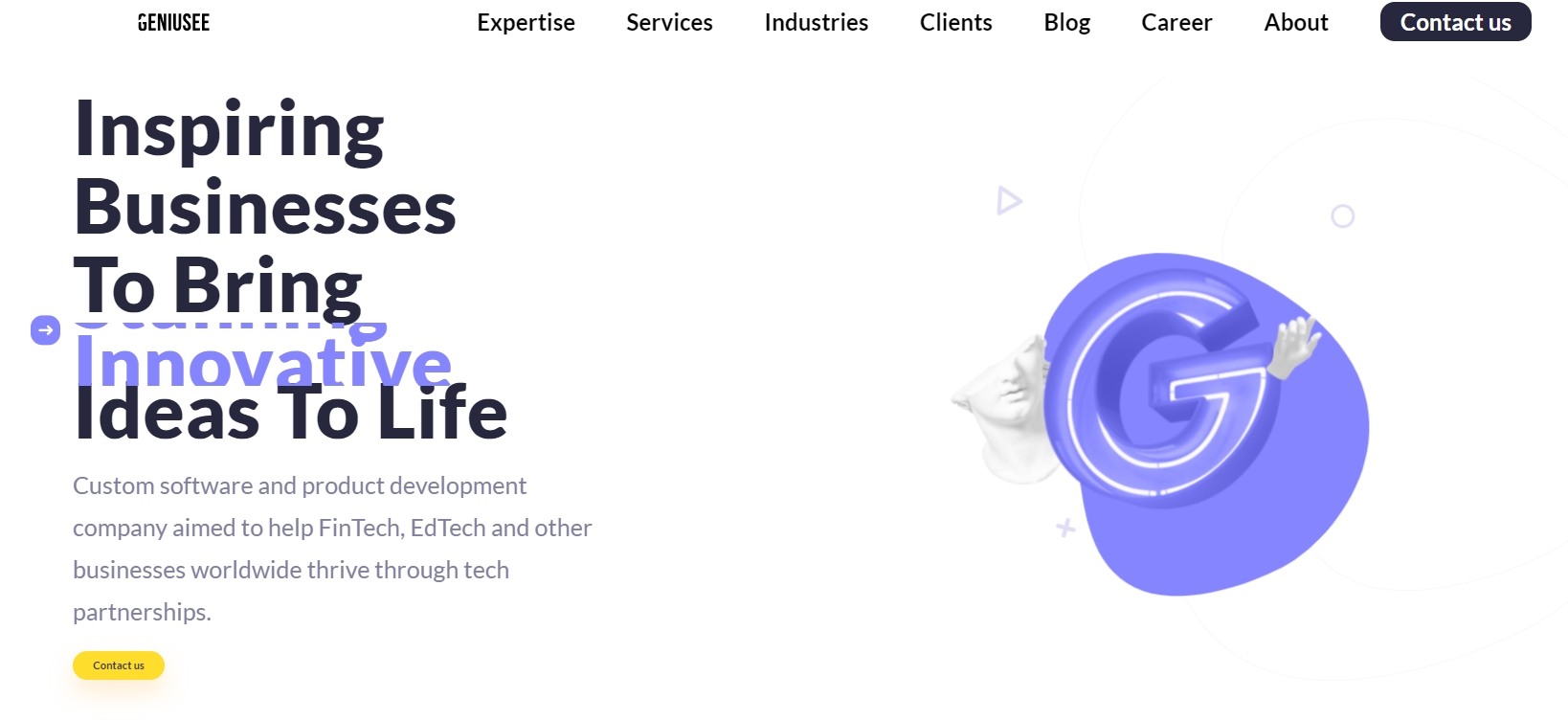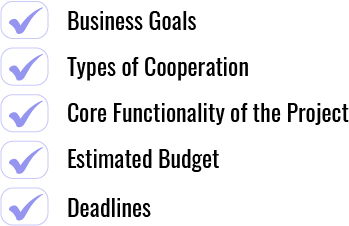- Questions to Ask When Choosing a Technical Partner
- Tech Partner Checklist for a Sales Manager
- Conclusion
Questions to Ask When Choosing a Technical Partner
Before you discuss all the technical details with the partner’s dedicated team or the project manager, the initial communication should take place between you and the sales manager. You can save your time and resources by asking the right questions to the sales manager about your potential tech partner.

Level of Communication
Smooth communication makes the entire collaboration and development process much easier. Communication gaps with your tech partner often lead to unexpected delays and dissatisfactions. When discussing your business idea with a technical partner, make sure you start with the means and terms of your communication during the collaboration.
To choose the right technical partner, you can start with the following set of questions.
- Means. What are their preferred means of communication? Examples include Skype, Zoom, phone calls, or emails.
- Frequency. How frequently will they communicate and report progress on assigned tasks? Depending on the task and business model, make your expectations clear.
- Urgency. How and whether you can reach the tech provider in case of an urgent situation.
Expertise in the Right Areas
Your ideal technical partner should have the right level of expertise suitable for your operational goals. Ask the following questions to ensure they can serve you with the highest quality.
- Team. You are looking for a tech partner because of the additional expertise they can bring to your business so having a great team is crucial. Ask them if they have a dedicated team. Also, do not forget to determine the team size.
- Project management process. What are the project management tools they would use for quality control and meeting deadlines? For example, many tech companies use scrum tools to manage projects better.
- Technology. What technology do they use, and how will it benefit your project? Get a clear idea.
- Brainstorming. Try to determine how the development teams would brainstorm about your tasks. Do they stay updated on the latest tech trends, and can they think out of the box?
- Understanding. Do they value the unique and tailored approach needed for each project?
- Past challenges. What are the past challenges they faced in their previous projects, and what was their approach to address these challenges?
- Flexibility. Can the partner remain creative throughout the development process? Are they too rigid about the requirement and workflow, or can they offer flexibility and scalability?
Considering the Price
Sourcing products or services at the right price will benefit your business and accounts. You would not want someone to steal your money. Would you? So how will you know that you are hiring your technical partner at the right price? Take a look at the following questions.
- Time. How much time would they spend on your project, and how would they adjust their time and schedule if changes are required during the development process? Time is a key factor that influences price.
- Material. What are the materials and software they will use in the process? If the software and the technology stack are complicated, a higher price may be justifiable.
- Fixed vs. variable. The partner may have both pricing models available—fixed and variable. Which one should you choose? Communicate your business needs and ask for their opinion. There are pros and cons associated with both, and you will need to factor in your specific needs before making a decision.
Transparency in the Working Process
From the very beginning, you need to have a clear idea about the workflow of your technical partner. A transparent workflow, especially during software development, will reduce elements of surprise and unexpected results along the way. Let’s review the following questions and areas you should discuss to ensure accountability.
Pre-development. To learn about transparency during the pre-development stage, ask the following questions.
What is the roadmap for the whole development cycle?
How will they research your business goals to give you the most optimal solution?
How will they document the workflow?
What are the estimates, and how will they document them?
Development. Will they have a procedure to document the coding and testing process performed by the development teams? How will they share the documents with you? Also, ask them if they can accommodate changes.
Post-development. You may have recommendations and feedback after the development is done. Can they incorporate that into the project? What documents will they provide you after the project is completed?
Maintenance and Support
Often, completion of a project is only a part of the assignment. As a client, you may need continuous support from the technical partner for a range of tasks, such as managing social media campaigns, maintaining your website, and so on. Discuss the following areas related to maintenance and support.
Development stages. For software development, what supporting services will they provide across the different stages of the development cycle?
Follow-up. Once the product is launched in the market, having regular follow-ups with your partner is important. Discuss the following questions.
How will they support you after you launch your product or software in the market?
How will they make it scalable to your business needs?
How will they conduct performance analysis and report it to you?
Quality Control
To ensure the best quality for the project, here is a set of questions you should ask your technical partner. These will help you learn how they will monitor the quality of outputs.
- Quality control. What procedures do they follow for quality control? Does the development company conduct sufficient beta-testing? From your discussion, try to determine if the quality control process will be a good fit for your project.
- QA engineers. Do they have quality assurance engineers within their team with sufficient expertise and technical knowledge, or do they have a mechanism to source QA support externally, if needed? Without QA engineers, your software development project may result in a negative user experience.
- Users’ feedback. Do they have a process to receive feedback from real users, and will they improve the product based on the feedback?
Testimonials
When choosing the right technical partner, you should request feedback from their previous or existing clients. Testimonials are great resources to get an idea about the quality of a service provider. To find out more, do not forget to include the following questions when you discuss the project with the sales manager.
Visible testimonials. Do they publish testimonials on their business website so that everyone can take a look? Are those testimonials verifiable?
Social media. Any service-oriented company would want to maintain a good social media presence nowadays. Take a look at their social media pages and ask the following questions.
Do they allow user reviews?
Do they engage with potential users by responding properly and promptly?
Do they remain active in all relevant social media channels?
Client references. Will they refer you to their previous clients? Can they provide you with samples? In many cases, a tech vendor may refer you to the clients from their successful project. This is very helpful because a real client may share some great insights with you.
Now that you know the questions to ask, you might be interested in a particular example of a technical partner with multiple dedicated teams, solid qualifications, and industry-leading technologies. Drop a note to Geniusee today to discuss your business needs.

Tech Partner Checklist for a Sales Manager
So far, we have discussed the questions you should ask of a tech partner. However, what if you are the technical partner? As we mentioned earlier, staying on the same page is important for both the client and the provider.

Thus, we also have a set of questions you should ask your potential client.
Business Goals
Knowing the business goals of your client would enable you to build the project plan perfectly and provide necessary production support. Try to ask the following questions from your potential client.
- Main goals. What are the main goals of the client’s business, and what are the goals for the particular project you would work on?
- Product development vs. improvement. Will you have to improve on an existing product, or will you develop a completely new product from scratch? Your methodology and pricing would vary based on that. Thus, it is important to learn beforehand.
Types of Cooperation
As a technical partner, you will develop your complete project plan based on the services or cooperations the client needs. To get a clear grasp, let’s discuss the following issues.
- Key involvement. What is the main involvement of you and your team in the development process? What type of services is the client looking for? Try to determine the client’s expectations for you.
- Role in the supply chain. What will the role of the service provider be in the client’s supply chain? Knowing this will greatly help you offer the most optimal services for the client.
Core Functionality of the Project
Before you offer any services, try to establish the core functionality of the project you will be working on. To get a clear idea, the technical partner can start with the following questions.
- Key elements. What are the key elements of the client’s project? For example, if it is a software development project, what are the intended platforms, and how will it help with the client’s business model?
- Process Flow. What are the steps the client wants to follow throughout the development process? How will the client define a successful output?
Estimated Budget
Prior knowledge of the client’s budget would help you offer the most appropriate pricing model for your services. However, a client may be a bit uncomfortable sharing their actual budget with potential partners. Yet, with a few questions, you may get a fairly good idea.
- Planned budget. What is the approximate budget for the project? Does the client want to take a subscription-based service? Or, would they be more comfortable with a one-time expense?
- Plan for unexpected costs. What are the client’s ideas and plans for handling unexpected costs? Are they flexible about costs or not?
Deadlines
One of the most important criteria that can make or break a business partnership for software development companies with a technical partner is adherence to deadlines. During your discussion, try to be very specific about asking clients about their expectations for the deadline. Make sure to ask the following questions.
- Date of release. What is the desired or planned date of launch? Do they have a flexible time window?
- Release of updated versions. If the client has plans to release updated versions, when should the update be released?
Conclusion
When choosing the right technical partner, you have to find out lots of information about vendors, e.g., their level of expertise and quality control. On the other hand, you have to provide some information about your business so that the vendor can offer the perfect deal for you.
Smooth and supportive communication with the intended partner’s sales manager can act as a crucial cornerstone of a great partnership. Both can get a clear idea about each other’s expectations and requirements, making it easy for the project managers from both companies to work effectively in the future. So make sure you ask the right questions and also provide the right answers.





















